Major Henry Charles David Marshall - Wallet 1 - Booklet 1 - Part 2
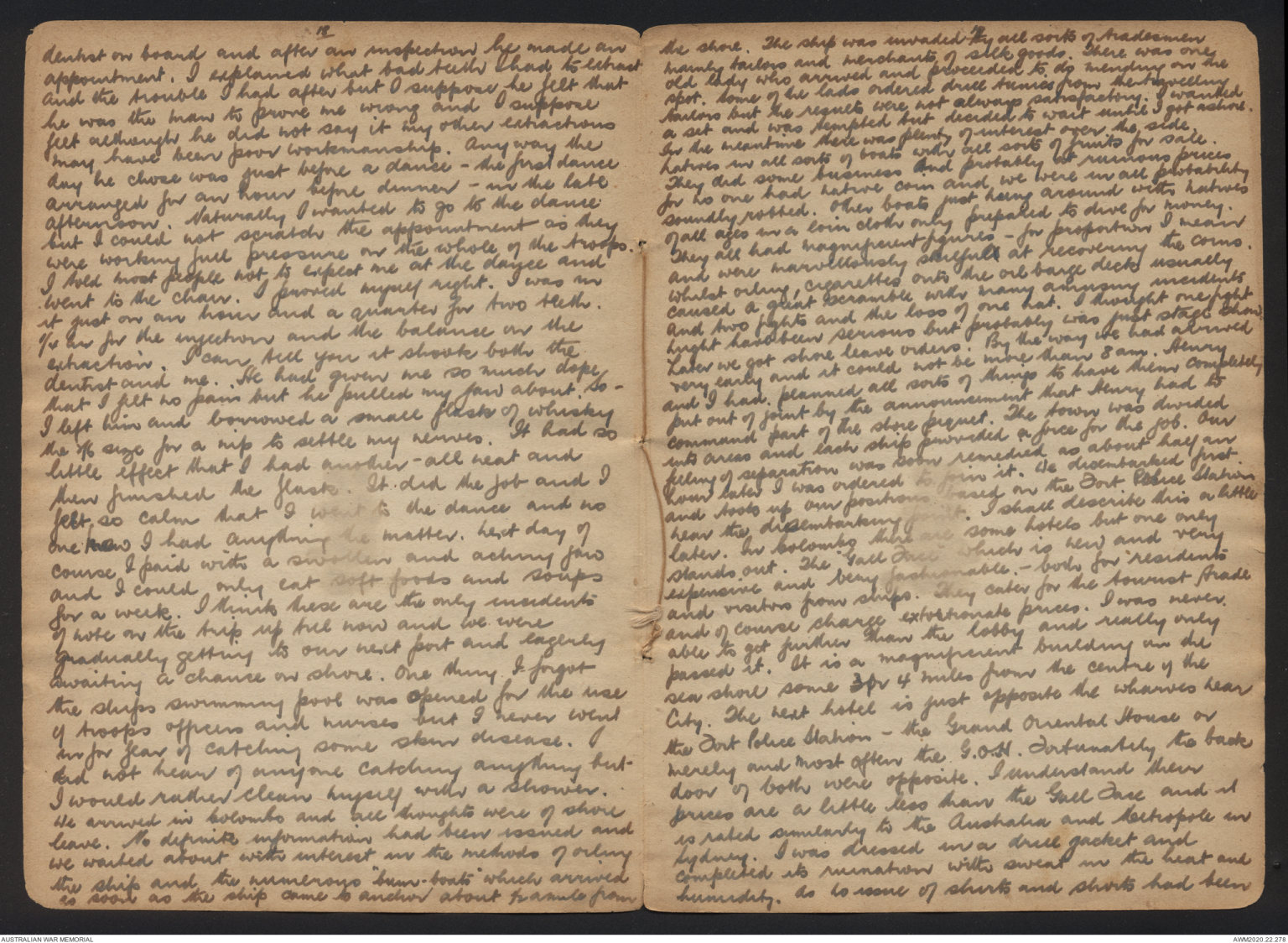
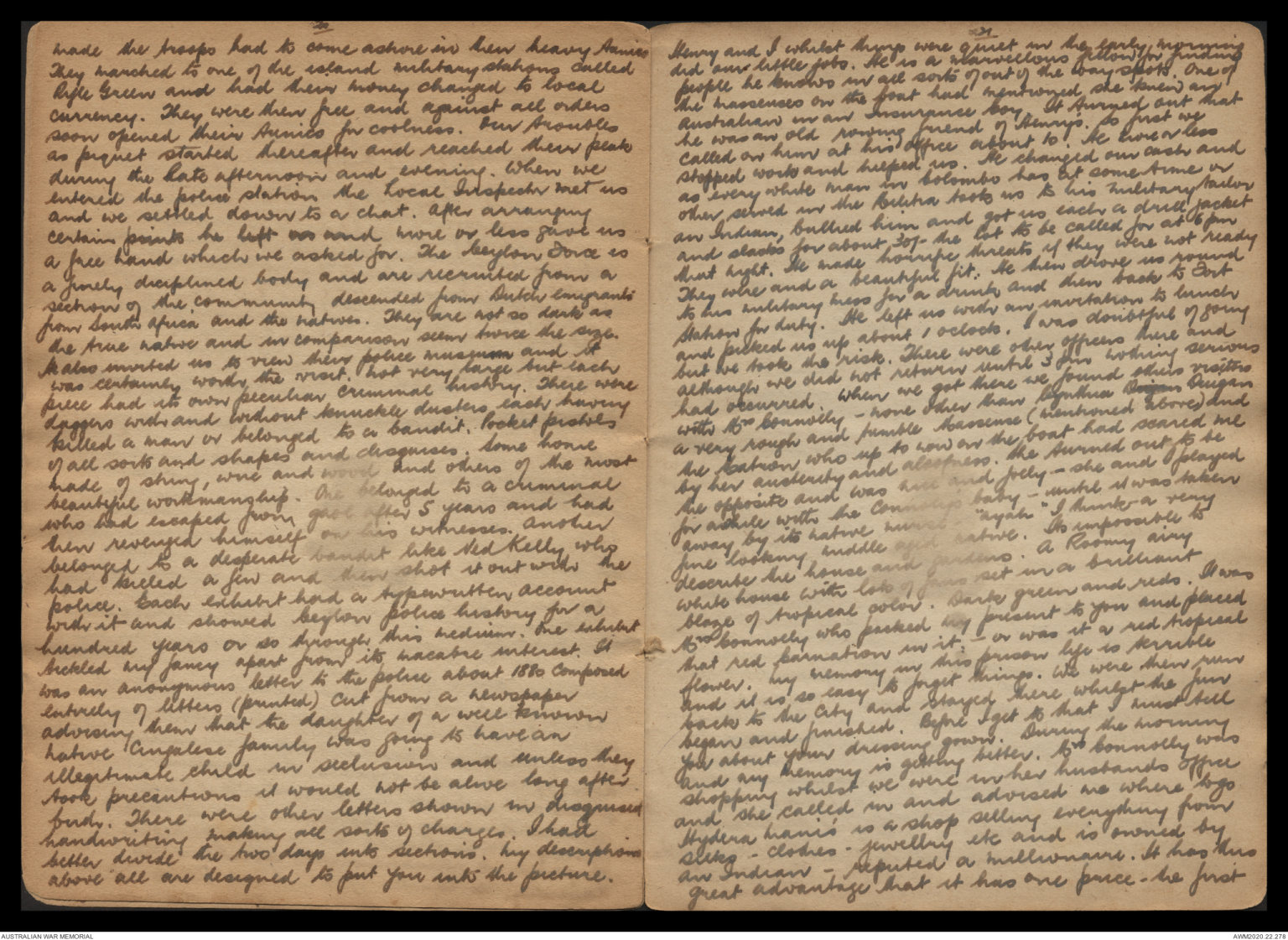
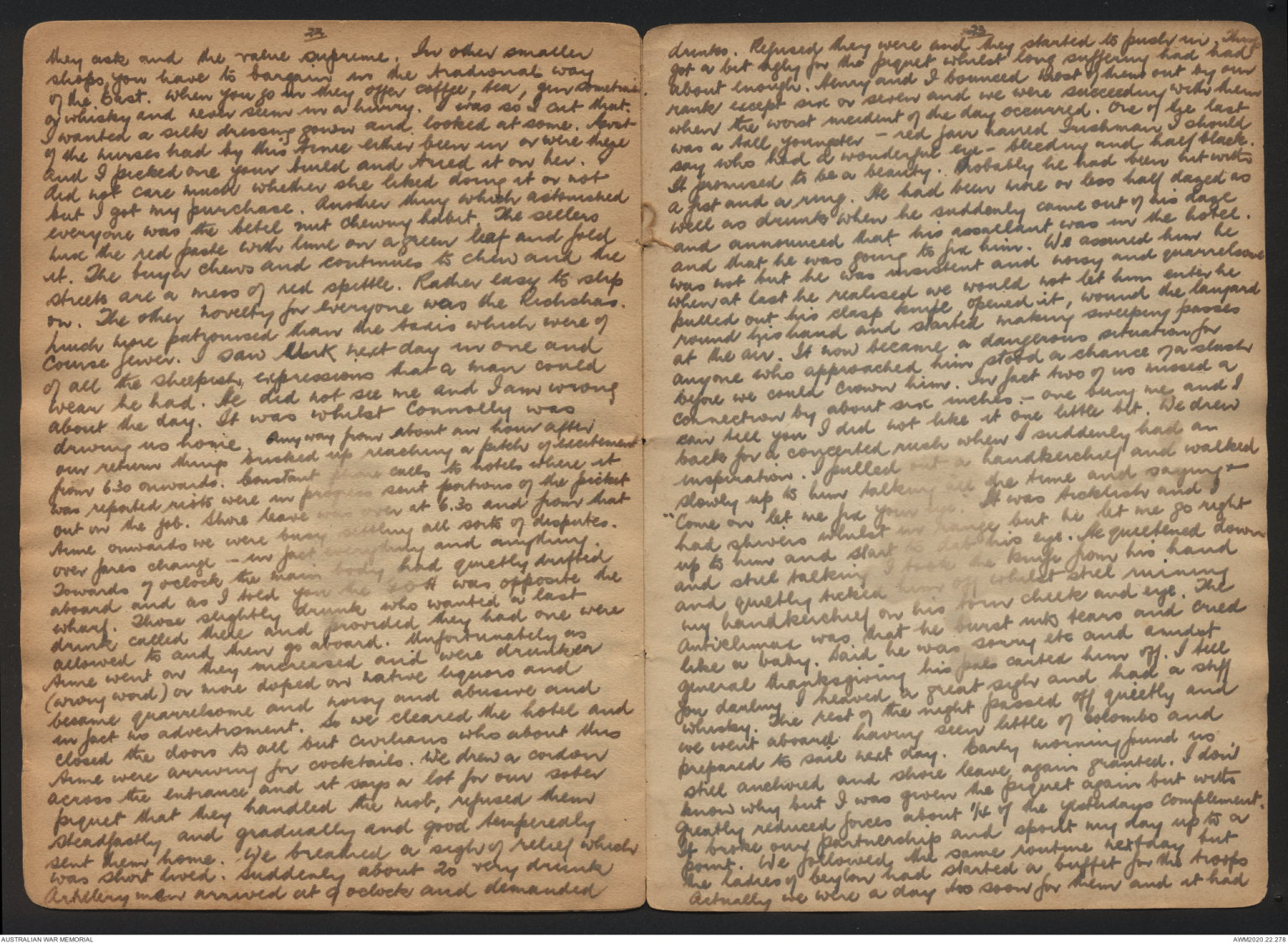
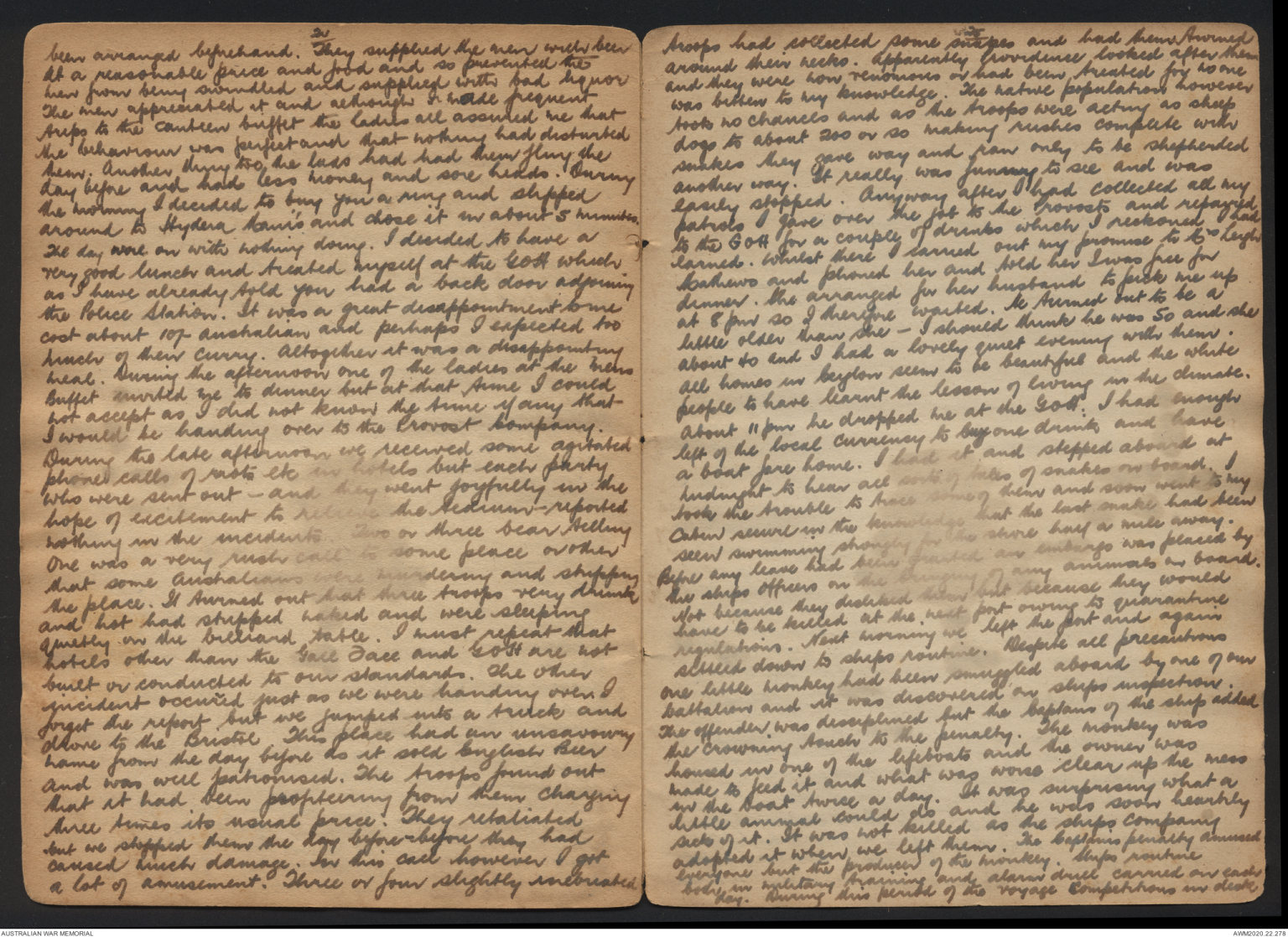
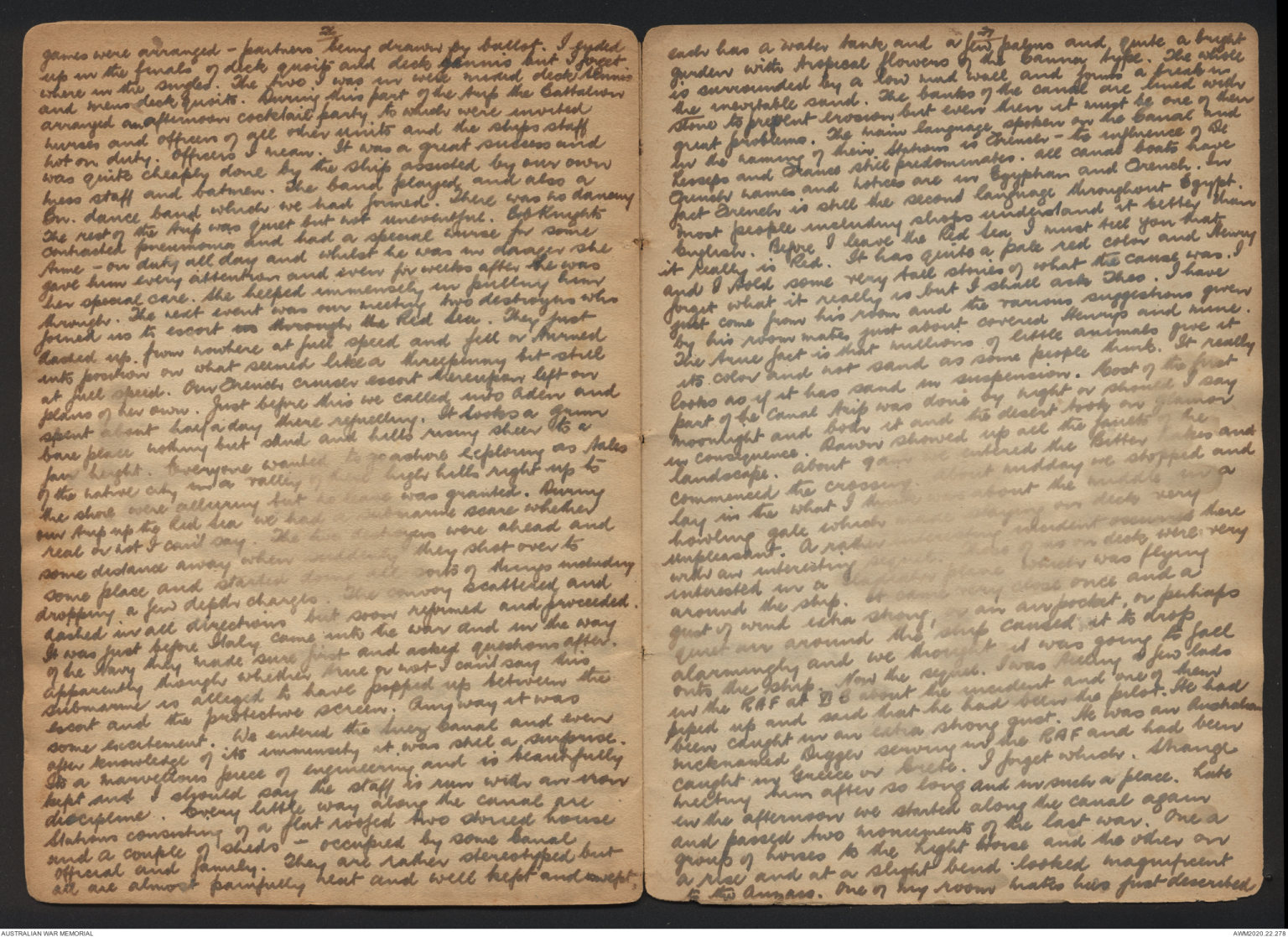
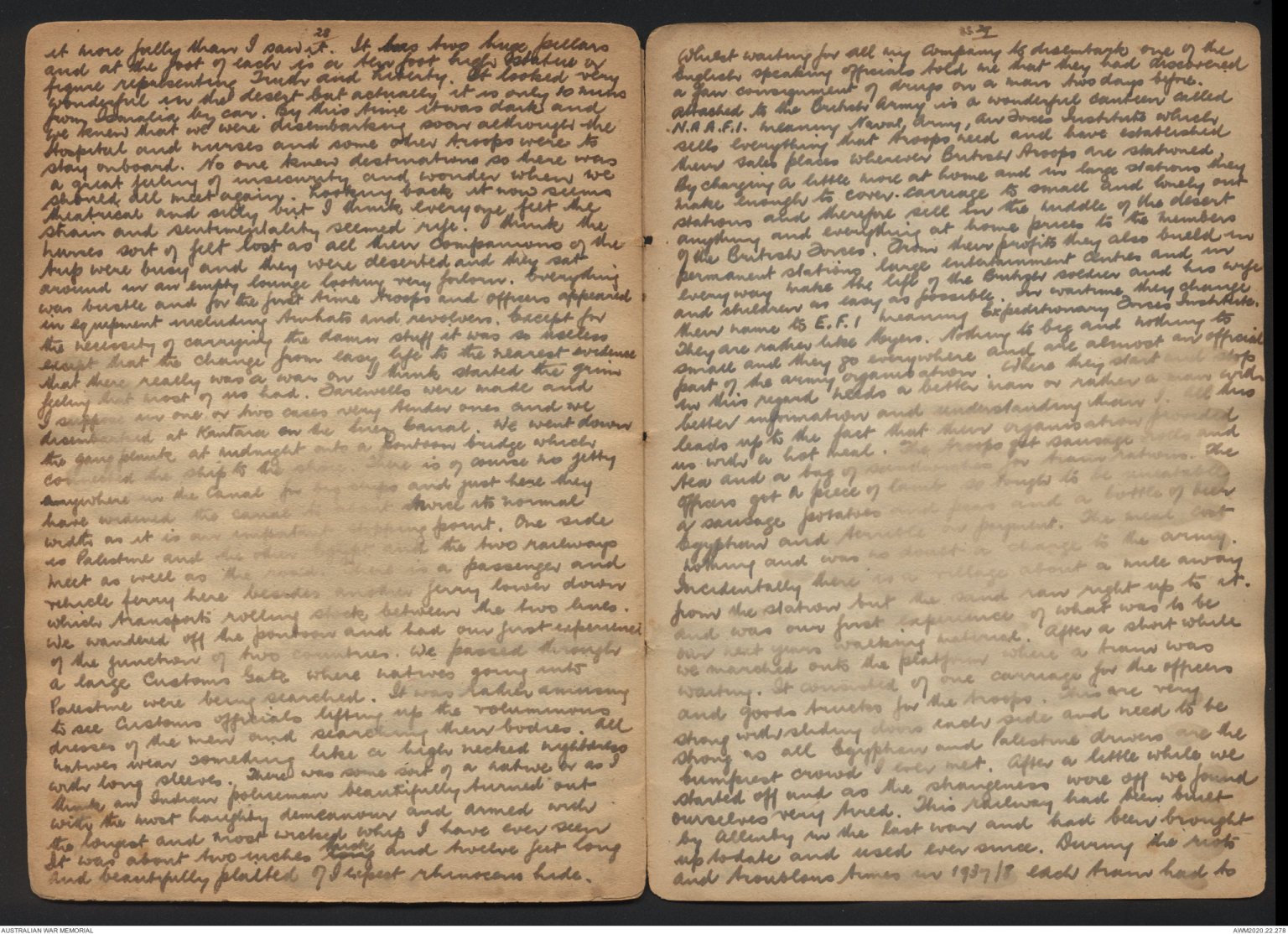
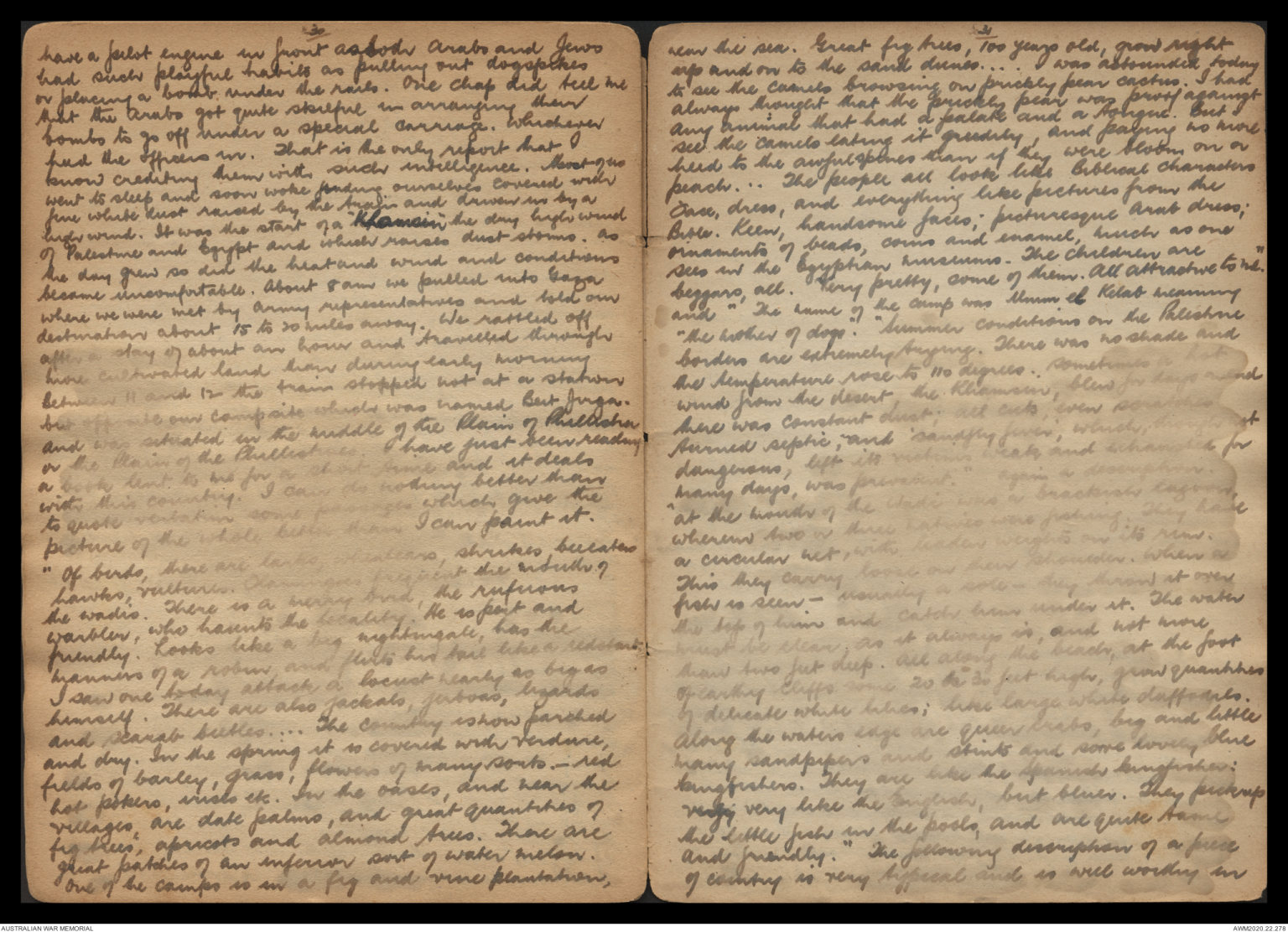
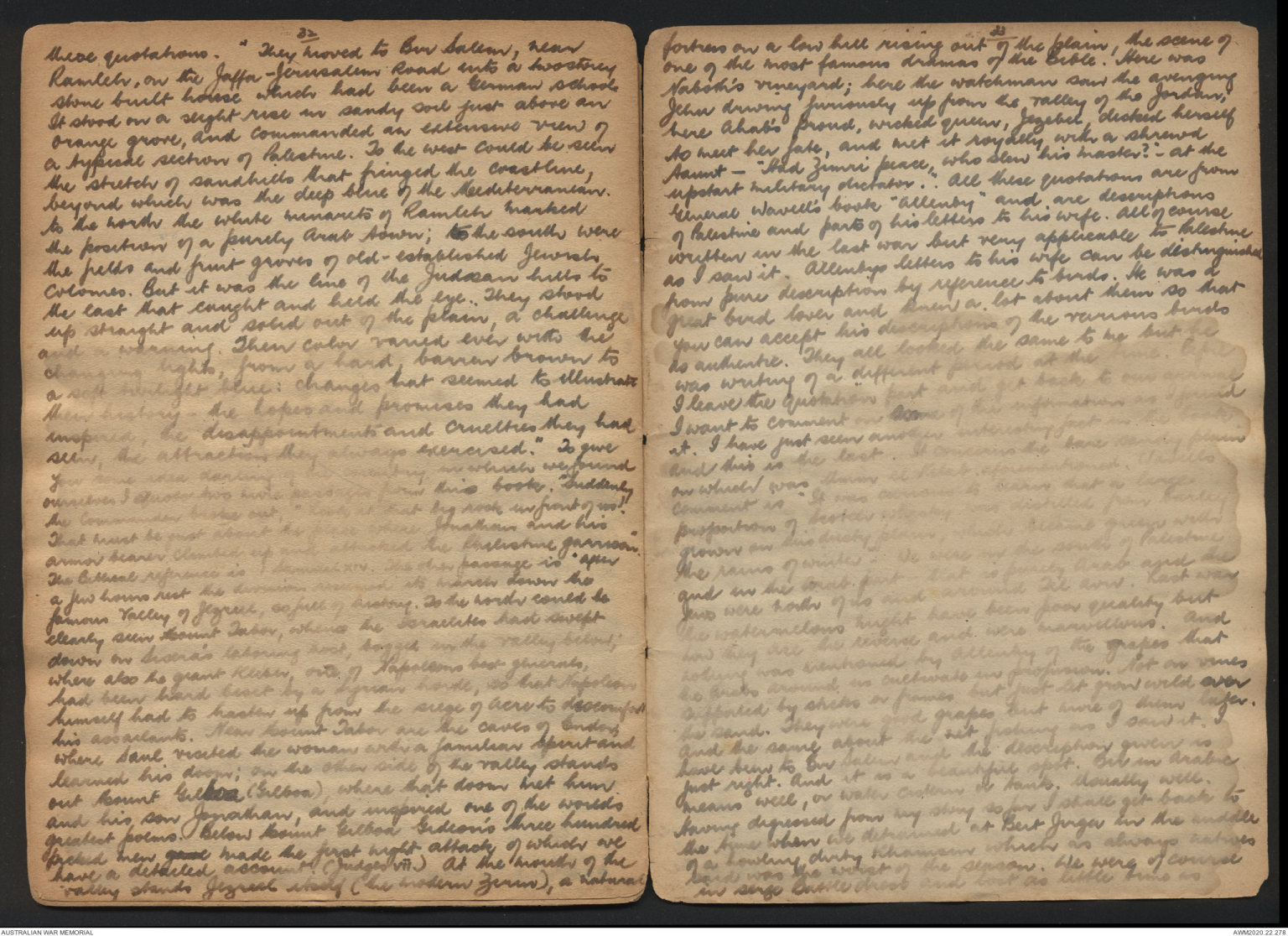
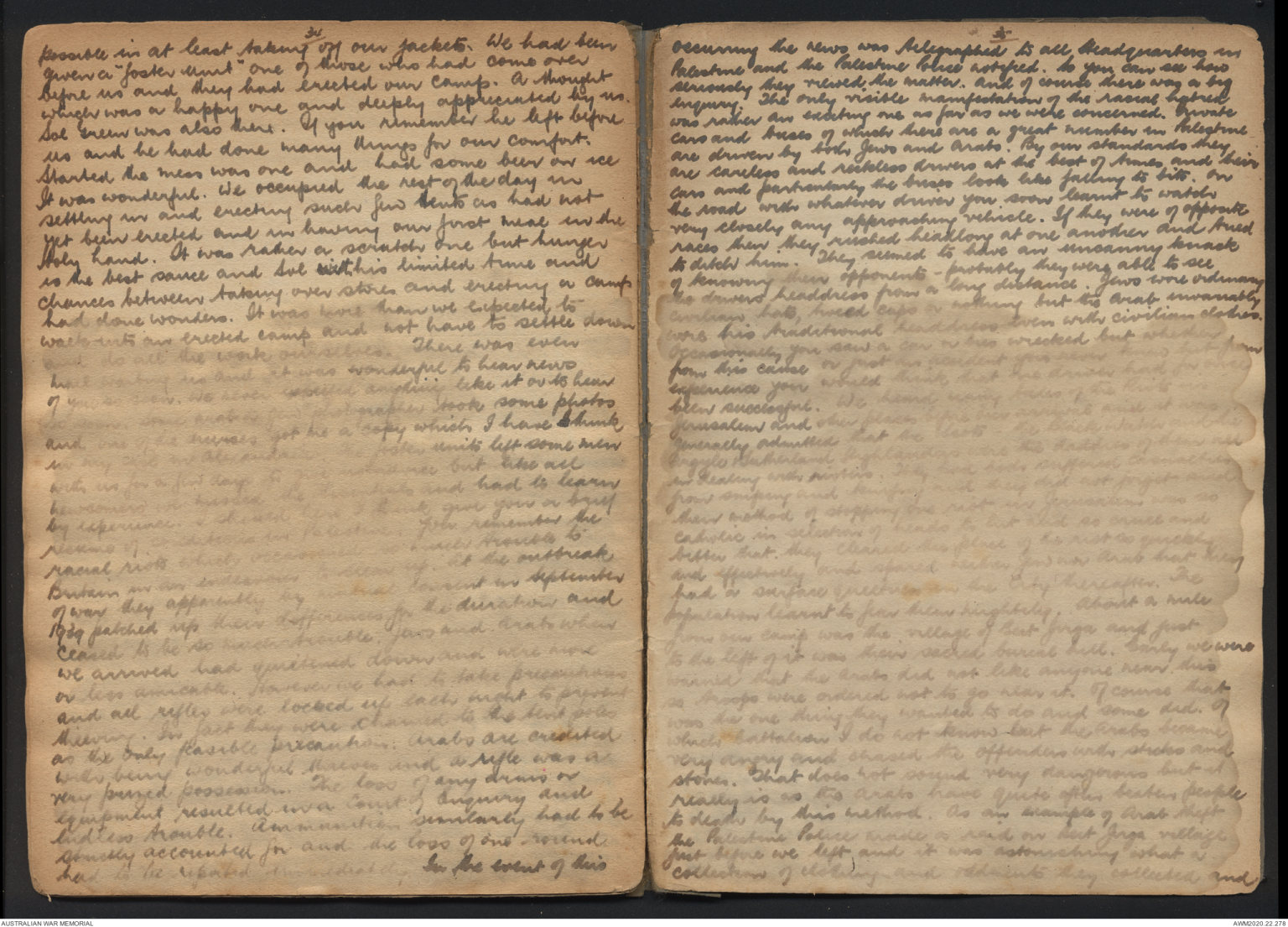
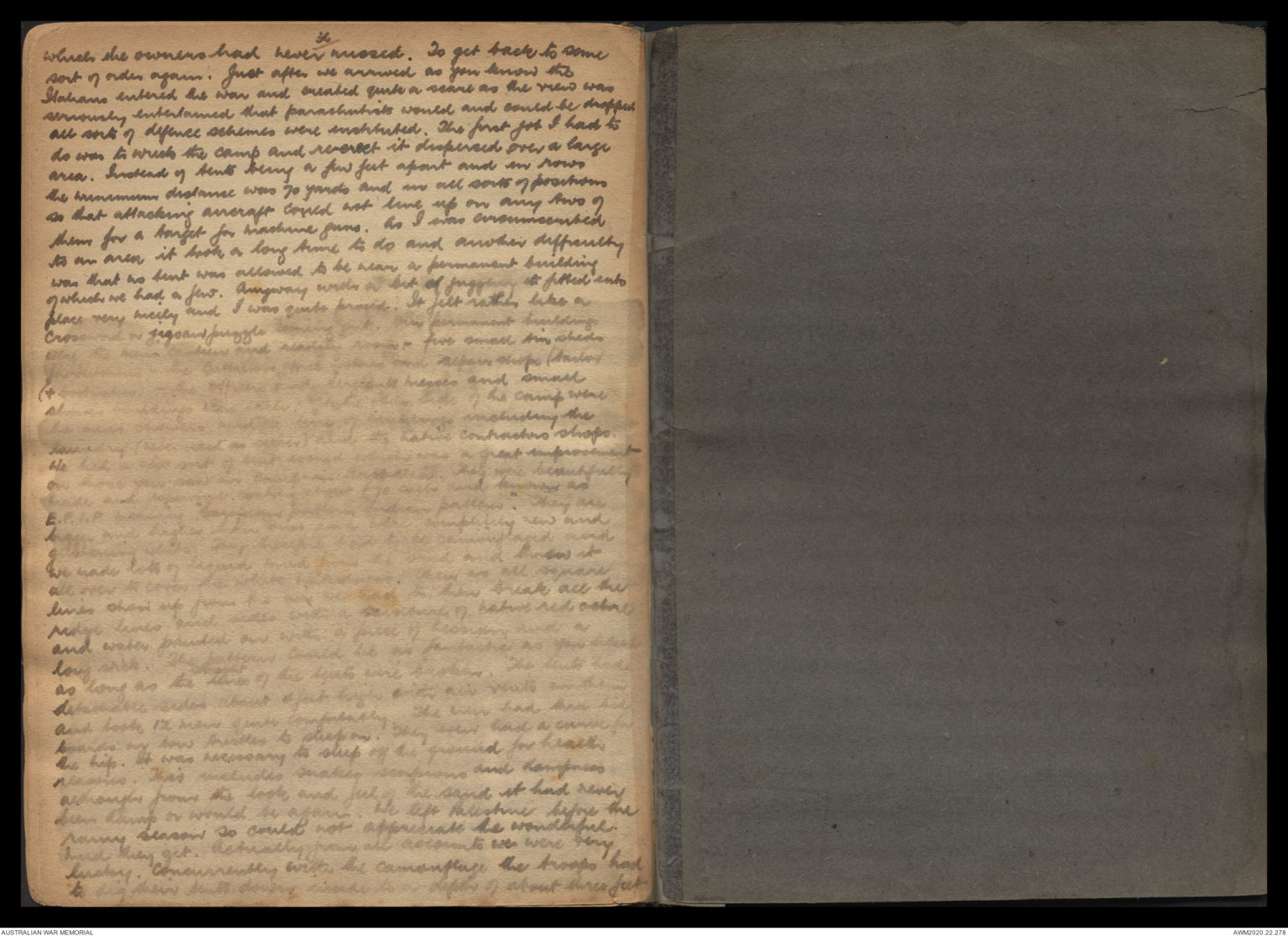
18
dentist on board and after an inspection he made an
appointment. I explained what bad teeth had to extract
and the trouble I had after but I suppose he felt that
he was the man to prove me wrong and I suppose
felt although he did not say it my other extractions
may have been poor workmanship. Anyway the
day he chose was just before a dance - the first dance
arranged for an hour before dinner - in the late
afternoon. Naturally I wanted to go to the dance
but I could not scratch the appointment as they
were working full pressure on the whole of the troops.
I told most people not to expect me at the dance and
went to the chair. I proved myself right. I was in
it just on an hour and a quarter for two teeth.
¼ hr for the injection and the balance on the
extraction. I can tell you it shook both the
dentist and me. He had given me so much dope
that I felt no pain but he pulled my jaw about. So -
I left him and borrowed a small flask of whisky
the 2/6 size for a nip to settle my nerves. It had so
little effect that I had another - all neat and
then finished the flask. It did the job and I
felt, so calm that I went to the dance and no
one knew I had anything the matter. Last day of
course I paid with a swollen and aching jaw
and I could only eat soft foods and soups
for a week. I think these are the only incidents
of note on the trip up till now and we were
gradually getting to our next port and eagerly
awaiting a chance on shore. One thing I forgot
the ships swimming pool was opened for the use
of troops officers and nurses but I never went
in for fear of catching some skin disease. I
did not hear of anyone catching anything but
I would rather clean myself with a shower.
We arrived in Colombo and all thoughts were of shore
leave. No definite information had been issued and
we waited about with interest in the methods of oiling
the ship and the numerous "bum-boats" which arrived
as soon as the ship came to anchor about for a mile from
19
the shore. The ship was invaded by all sorts of tradesmen
mainly tailors and merchants of silk goods. There was one
old lady who arrived and proceeded to do mending on the
spot. Some of the lads ordered drill tunics from the travelling
tailors but the results were not always satisfactory. I wanted
a set and was tempted but decided to wait until I got ashore.
In the meantime there was plenty of interest over the side.
Natives in all sorts of boats with all sorts of fruits for sale.
They did some business and probably at ruinous prices
for no one had native coin and we were in all probability
soundly robbed. Other boats just hung around with natives
of all ages in a loin cloth only prepared to dive for money.
They all had magnificent figures - for proportion I mean
and were marvellously skilfull at recovering the coins.
Whilst oiling, cigarettes onto the oil barge deck usually
caused a giant scramble with many amusing incidents
and two fights and the loss of one hat. I thought one fight
might have been serious but probably was just stage show.
Later we got shore leave orders. By the way we had arrived
very early and it could not be more than 8 am. Henry
and I had planned all sorts of things to have them completely
put out of joint by the announcement that Henry had to
command part of the shore piquet. The town was divided
into areas and each ship provided a force for the job. Our
feeling of separation was soon remedied as about half an
hour later I was ordered to join it. We disembarked first
and took up our positions based on the Fort Police Station
near the disembarking point. I shall describe this a little
later. In Colombo there are some hotels but one only
stands out. The "Gall Face" which is new and very
expensive and very fashionable - both for 'residents'
and visitors from ships. They cater for the tourist trade
and of course charge extortionate prices. I was never
able to get further than the lobby and really only
passed it. It is a magnificent building on the
sea shore some 3 or 4 miles from the centre of the
City. The next hotel is just opposite the wharves near
the Fort Police Station - the Grand Oriental House or
merely and most often the G.O.H. Fortunately the back
door of both were opposite. I understand their
prices are a little less than the Gall Face and it
is rated similarly to the Australia and Metropole in
Sydney. I was dressed in a drill jacket and
completed its ruination with sweat in the heat and
humidity. As no issue of shirts and shorts had been
20
made the troops had to come ashore in their heavy tunics
They marched to one of the island military stations called
Rifle Green and had their money changed to local
currency. They were then free and against all orders
soon opened their tunics for coolness. Our troubles
as piquet started thereafter and reached their peak
during the late afternoon and evening. When we
entered the police station the Local Inspector met us
and we settled down to a chat. After arranging
certain points he left us and more or less gave us
a free hand which we asked for. The Ceylon Force is
a finely disciplined body and are recruited from a
section of the community descended from Dutch emigrants
from South Africa and the natives. They are not so dark as
the true native and in comparison seem twice the size.
He also invited us to view their police museum and it
was certainly worth the visit. Not very large but each
piece had its own peculiar criminal history. There were
daggers with and without knuckle dusters each having
killed a man or belonged to a bandit. Pocket pistols
of all sorts and shapes and disguises. Some home
made of string, wire and wood and others of the most
beautiful workmanship. One belonged to a criminal
who had escaped from goal after 5 years and had
then revenged himself on his witnesses. Another
belonged to a desperate bandit like Ned Kelly who
had killed a few and then shot it out with the
police. Each exhibit had a typewritten account
with it and showed Ceylon Police history for a
hundred years or so through this medium. One exhibit
tickled my fancy apart form its macabre interest. It
was an anonymous letter to the Police about 1880 composed
entirely of letters (printed) cut from a newspaper
advising them that the daughter of a well known
native Congalese family was going to have an
illegitimate child in seclusion and unless they
took precautions it would not be alive long after
birth. There were other letters shown in disguised
handwriting making all sorts of charges. I had
better divide the two days into sections. My descriptions
above all are designed to put you into the picture.
21
Henry and I whilst things were quiet in the early morning
did our little jobs. He is a marvellous fellow for finding
people he knows in all sorts of out of the way spots. One of
the masseuses on the boat had mentioned she knew an
Australian in an Insurance Coy. It turned out that
he was an old rowing friend of Henry's. So first we
called on him at his office about 10. He more or less
stopped work and helped us. He changed our cash and
as every white man in Colombo has at sometime of
other served in the Militia took us to his Military tailor
an Indian, bullied him and got us each a drill jacket
and slacks for about 30/- the lot to be called for at 6pm
that night. He made horrific threats if they were not ready.
They were and a beautiful fit. He then drove us round
to his military mess for a drink and then back to Fort
Station for duty. He left us with an invitation to lunch
and picked us up about 1 o'clock. I was doubtful of going
but we took the risk. There were other officers there and
although we did not return until 3pm nothing serious
had occurred. When we got there we found others visitors
with Mrs. Connolly - none other than Cynthia Doigan Duigan
a very rough and tumble Masseuse (mentioned above) and
the Matron who up to now on the boat had scared me
by her austerity and aloofness. She turned out to be
the opposite and was nice and jolly - she and I played
for a while with the Connolly's baby - until it was taken
away by its native nurse - "ayah" I think a very
fine looking middle aged native. Its impossible to
describe the house and gardens. A Roomy airy
white house with lots of ferns set in a brilliant
blaze of tropical color. Dark green and reds. It was
Mrs. Connolly who packed my present to you and placed
that red carnation in it - or was it a red tropical
flower. My memory in this prison life is terrible
and it is so easy to forget things. We were then run
back to the city and stayed there whilst the fun
began and finished. Before I get to that I must tell
you about your dressing gown. During the morning
and my memory is getting better. Mrs. Connolly was
shopping whilst we were in her husbands office
and she called in and advised me where to go
Hydera Mani's is a shop selling everything from
silks - clothes - jewellery etc and is owned by
an Indian - reputed a millionaire. It has this
great advantage that it has one price - the first
22
they ask and the value supreme. In other smaller
shops you have to bargain in the traditional way
of the East. When you go in they offer coffee, tea, gin sometimes
or whisky and never seem in a hurry. I was so I cut that.
I wanted a silk dressing gown and looked at some. Most
of the nurses had by this time either been in or were there
and I picked one your build and tried it on her. I
did not care much whether she liked doing it or not
but I got my purchase. Another thing which astonished
everyone was the betel nut chewing habit. The sellers
have the red paste with lime on a green leaf and fold
it. The buyer chews and continues to chew and the
streets are a mess of red spittle. Rather easy to slip
on. The other novelty for everyone was the Rickshas.
Much more patronised than the taxis which were of
Course fewer. I saw Mark next day in one and
of all the sheepish expressions that a man could
wear he had. He did not see me and I am wrong
about the day. It was whilst Connolly was
driving us home. Anyway from about an hour after
our return things brisked up reaching a pitch of excitement
from 6.30 onwards. Constant phone calls to hotels where it
was reported riots were in progress sent portions of the picket
out on the job. Shore leave was over at 6.30 and from that
time onwards we were busy settling all sorts of disputes.
over fares change - in fact everything and anything.
Towards 7 o'clock the main body had quietly drifted
aboard and as I told you the GOH was opposite the
wharf. Those slightly drunk who wanted a last
drink called there and provided they had one were
allowed to and then go aboard. Unfortunately as
time went on they increased and were drunken
(wrong word) or more doped on native liquors and
became quarrelsome and noisy and abusive and
in fact no advertisement. So we cleared the hotel and
closed the doors to all by civilians who about this
time were arriving for cocktails. We drew a cordon
across the entrance and it says a lot for our sober
piquet that they handled the mob, refused them
steadfastly and gradually and good temperedly
sent them home. We breathed a sigh of relief which
was short lived. Suddenly about 20 very drunk
Artillery men arrived at 9 o'clock and demanded
23
drinks. Refused they were and they started to push in. Things
got a bit ugly for the piquet whilst long suffering had had
about enough. Henry and I bounced most of them out by our
rank except six or seven and we were succeeding with them
when the worst incident of the day occurred. One of the last
was a tall youngster - red fair haired Irishman I should
say who had a wonderful eye - bleeding and half black.
It promised to be a beauty. Probably he had been hit with
a fist and a ring. He had been more or less half dazed as
well as drunk when he suddenly came out of his daze
and announced that his assailant was in the hotel.
and that he was going to fix him. We assured him he
was not but he was insistent and noisy and quarrelsome
when at last he realised we would not let him enter he
pulled out his clasp knife, opened it, wound the lanyard
round his hand and started making sweeping passes
at the air. It now became a dangerous situation for
anyone who approached him stood a chance of a slash
before we could crown him. In fact two of us missed a
connection by about six inches.- one being me and I
can tell you I did not like it one little bit. We drew
back for a concerted rush when I suddenly had an
inspiration. I pulled out a handkerchief and walked
slowly up to him talking all the time and saying -
"Come on let me fix your eye". It was ticklish and
had shivers whilst in range but he let me go right
up to him and start to dab his eye. He quietened down
and still talking I took the knife from his hand
and quietly tucked him off whilst still ruining
my handkerchief on his torn cheek and eye. The
anticlimax was that he burst into tears and cried
like a baby. Said he was sorry etc and amidst
general thanksgiving his pals carted him off. I tell
you darling I heaved a great sigh and had a stiff
whisky. The rest of the night passed off quietly and
we went aboard having seen little of Colombo and
prepared to sail next day. Early morning found us
still anchored and shore leave again granted. I don't
know why but I was given the piquet again but with
greatly reduced forces about ¼ of the yesterdays complement.
It broke our partnership and spoilt my day up to a
point. We followed the same routine next day but
the ladies of Ceylon had started a buffet for the troops
actually we were a day too soon for them and it had
24
been arranged beforehand. They supplied the men with beer
at a reasonable price and food and so prevented the
men from being swindled and supplied with bad liquor.
The men appreciated it and although I made frequent
trips to the canteen buffet the ladies all assured me that
the behaviour was perfect and that nothing had disturbed
them. Another thing too the lads had had their fling the
day before and had less money and sore heads. During
the morning I decided to buy you a ring and slipped
around to Hydera Maur's and chose it in about 5 minutes.
The day wore on with nothing doing. I decided to have a
very good lunch and treated myself at the GOH which
as I have already told you had a back door adjoining
the Police Station. It was a great disappointment to me
cost about 10/- Australian and perhaps I expected too
much of their curry. Altogether it was a disappointing
meal. During the afternoon one of the ladies at the mens
Buffet invited me to dinner but at the time I could
not accept as I did not know the time if any that
I would be handing over to the Provost Company.
During the late afternoon we received some agitated
phone calls of riots etc in hotels but each party
who were sent out - and they went joyfully in the
hope of excitement to relieve the tedium - reported
nothing in the incidents. Two or three bear telling.
One was a very rush call to some place or other
that some Australians were murdering and stripping
the place. It turned out that three troops very drunk
and hot had stripped naked and were sleeping
quietly on the billiard table. I must repeat that
hotels other than the Gall Face and GOH are not
built or conducted to our standards. The other
incident occurred just as we were handing over. I
forget the report but we jumped into a truck and
drove to the Bristol. This place had an unsavoury
name from the day before as it sold English Beer
and was well patronised. The troops found out
that it had been profiteering from them charging
three times its usual price. They retaliated
but we stopped them the day before - before they had
caused much damage. In this call however I got
a lot of amusement. Three or four slightly inebriated
25
troops had collected some snakes and had them twined
around their necks. Apparently providence looked after them
and they were non venomous or had been treated for no one
was bitten to my knowledge. The native population however
took no chances and as the troops were acting as sheep
dogs to about 200 or so making rushes complete with
snakes they gave way and ran only to be shepherded
another way. It really was funny to see and was
easily stopped. Anyway after had collected all my
patrols I gave over the job to the provosts and reported
to the GOH for a couple of drinks which I reckoned I had
earned. Whilst there I carried out my promise to Mrs. Leigh
Mathews and phoned her and told her I was free for
dinner. She arranged for her husband to pick me up
at 8pm so I therefore waited. He turned out to be a
little older than she - I should think he was 50 and she
about 40 and I had a lovely quiet evening with them.
All homes in Ceylon seem to be beautiful and the white
people to have learnt the lesson of living in the climate.
About 11 pm he dropped me at the GOH. I had enough
left of the local currency to buy one drink and have
a boat fare home. I had it and stepped aboard at
midnight to hear all sorts of tales of snakes on board. I
took the trouble to trace some of them and soon went to my
cabin secure in the knowledge that the last snake had been
seen swimming strongly for the shore half a mile away.
Before any leave had been granted an embargo was place by
the ships officers on the bringing of any animals on board.
Not because they disliked them but because they would
have to be killed at the next port owing to quarantine
regulations. Next morning we left the port and again
settled down to ships routine. Despite all precautions
one little monkey had been smuggled aboard by one of our
battalion and it was discovered on ships inspection.
The offender was disciplined but the Captain of the ship added
the crowning touch to the penalty. The monkey was
housed in one of the lifeboats and the owner was
made to feed it and what was worse clear up the mess
in the boat twice a day. It was surprising what a
little animal could do and he was soon heartily
sick of it. It was not killed as the ships company
adopted it when we left them. The Captains penalty amused
everyone but the producer of the monkey. Ships routine
body in military training and alarm drill carried on each
day. During this period of the voyage competitions on deck
26
games were arranged - partners being drawn by ballot. I ended
up in the finals of deck quoits and deck tennis but forget
where in the singles. The two, I was in were mixed deck tennis
and mens deck quoits. During this part of the trip the Battalion
arranged an afternoon cocktail party to which were invited
nurses and officers of all other units and the ships staff
not on duty. Officers I mean. It was a great success and
was quite cheaply done by the ship assisted by our own
mess staff and batmen. The band played and also a
Bn. dance band which we had formed. There was no dancing.
The rest of the trip was quiet but not uneventful. Bob Knights
contracted pneumonia and had a special nurse for some
time - on duty all day and whilst he was in danger she
gave him every attention and even for weeks after he was
her special car. She helped immensely in pulling him
through. The next event was our meeting two destroyers who
joined us to escort us through the Red Sea. They just
dashed up from nowhere at full speed and fell or turned
into position on what seemed like a threepenny bit still
at full speed. Our French cruiser escort thereupon left on
plans of her own. Just before this we called into Aden and
spent about half a day there refuelling. It looks a grim
bare place nothing but sand and hills rising sheer to a
full height. Everyone wanted to go ashore exploring as tales
of the native city in a valley of these high hills right up to
the shore were alluring but no leave was granted. During
our trip up the Red Sea we had a submarine scare whether
real or not I can't say. The two destroyers were ahead and
some distance away when suddenly they shot over to
some place and started doing all sorts of things including
dropping a few depth charges. The convoy scattered and
dashed in all directions but soon reformed and proceeded.
It was just before Italy came into the war and in the way
of the Navy they made sure first and asked questions after.
Apparently though whether true or not I can't say this
submarine is alleged to have popped up between the
escort and the protective screen. Anyway it was
some excitement. We entered the Suez Canal and even
after knowledge of its immensity it was still a surprise.
Its a marvellous piece of engineering and is beautifully
kept and I should say the staff is run with an iron
discipline. Every little way along the canal are
Stations consisting of a flat roofed two storied house
and a couple of sheds - occupied by some Canal
official and family. They are rather stereotyped but
all are almost painfully neat and well kept and swept,
27
each has a water tank and a few palms and quite a bright
garden with tropical flowers of the Canna type. The whole
is surrounded by a low mud wall and forms a break in
the inevitable sand. The banks of the canal are lined with
stone to prevent erosion but even then it must be one of their
great problems. The main language spoken of the Canal and
in the naming of their stations is French - the influence of De
Lesseps and France still predominates. All canal boats have
French names and notices are in Egyptian and French. In
fact French is still the second language throughout Egypt.
Most people including shops understand it better than
English. Before I leave the Red Sea I must tell you that
it really is Red. It has quite a pale red color and Henry
and I told some very tall stories of what the cause was. I
forget what it really is but I shall ask Theo. I have
just come from his room and the various suggestions given
by his room mates just about covered Henry's and mine.
The true fact is that millions of little animals give it
its color and not sand as some people think. It really
looks as if is has sand in suspension. Most of the first
part of the Canal trip was done by night or should I say
moonlight and both it and the desert took on glamor
in consequence. Dawn showed up all the faults of the
landscape. About 9am we entered the Bitter Lakes and
commenced the crossing. About midday we stopped and
lay in the what I think was about the middle in a
howling gale which made staying on deck very
unpleasant. A rather interesting incident occurred there
with an interesting sequel. Those of us on deck were very
interested in a Gladiator plane which was flying
around the ship. It came very close once and a
gust of wind extra strong, or an air pocket, or perhaps
quiet air around the ship caused it to drop
alarmingly and we thought it was going to fall
onto the ship. Now the sequel. I was telling a few lads
in the RAF at DB about the incident and one of them
piped up and said that he had been the pilot. He had
been caught in an extra strong gust. He was an Australian
nickednamed Digger serving in the RAF and had been
caught in Greece or Crete. I forget which. Strange
meeting him after so long and in such a place. Late
in the afternoon we started along the canal again
and passed two monuments of the last war. One a
group of horses to the Light Horse and the other on
a rise and at a slight bend looked magnificent
to the Anzacs. One of my room mates has just described
28
it more fully than I saw it. It has two huge pillars
and at the foot of each is a ten foot high statue or
frame representing Truth and Liberty. It looked very
wonderful in the desert but actually it is only 10 mins
from Ismailia by car. By this time it was dark and
we knew that we were disembarking soon although the
Hospital and nurses and some other troops were to
stay onboard. No one knew destinations so there was
a great feeling of insecurity and wonder when we
should all meet again. Looking back it now seems
theatrical and silly but I think everyone felt the
strain and sentimentality seemed rife. I think the
nurses sort of felt lost as all their companions of the
trip were busy and they were deserted and they sat
around in an empty lounge booking very forlorn. Everything
was bustle and for the first time troops and officers appeared
in equipment including [[Awhats?]] and revolvers. Except for
the necessity of carrying the damn stuff it was so useless
except that the change from easy life to the nearest evidence
that there really was a war on I think started the grim
feeling that most of us had. Farewells were made and
I suppose in one or two cases very tender ones and we
disembarked at Kantara on the Suez Canal. We went down
the gang plank at midnight onto a pontoon bridge which
connected the ship to the shore. There is of course no jetty
anywhere in the Canal for big ships and just here they
have widened the canal to about twice its normal
width as it is our important stopping point. One side
is Palestine and the other Egypt and the two railways
meet as well as the road. There is a passenger and
vehicle ferry here besides another ferry lower down
which transports rolling stock between the two lines.
We wandered off the pontoon and has our first experience
of the junction of two countries. We passed through
a large Customs Gate where natives going into
Palestine were being searched. It was rather amusing
to see Customs officials lifting up the voluminous
dresses of the men and searching their bodies. All
natives wear something like a high necked nightdress
with long sleeves. There was some sort of a native or as I
think an Indian policeman beautifully turned out
with the most haughty demeanour and armed with
the longest and most wicked whip I have ever seen.
It was about two inches thick and twelve feet long
and beautifully plaited of I expected rhinoceros hide.
[[?]]29
Whilst waiting for all my Company to disembark one of the
English speaking officials told me that they had discovered
a fair consignment of drugs on a man two days before.
Attached to the British Army is a wonderful canteen called
N.A.A.F.I. meaning Naval, Army, Air Force Institute which
sells everything that troops need and have established
their sales places wherever British troops are stationed.
By charging a little more at home and in large stations they
make enough to cover carriage to small and lonely out
stations and therefore sell in the middle of the desert
anything and everything at home prices to the members
of the British Forces. From their profits they also build in
permanent stations large entertainment centres and in
every way make the life of the British soldier and his wife
and children as easy as possible. In wartime they change
their name to E.F.I. meaning Expeditionary Forces Institute.
They are rather like Myers. Nothing to big and nothing to
small and they go everywhere and are almost an official
part of the army organisation. Where they start and stop
in this regard needs a better man or rather a man with
better information and understanding than I. All this
leads up to the fact that their organisation provided
us with a hot meal. The troops got sausage rolls and
tea and a bag of sandwiches for train rations. The
officers got a piece of lamb so tough to be uneatable
a sausage, potatoes with peas and a bottle of beer
Egyptian and terrible on payment. The meal cost
nothing and was no doubt a charge to the army.
Incidentally there is a village about a mile away
from the station but the sand ran right up to it.
and was our first experience of what was to be
our next years walking material. After a short while
we marched onto the platform where a train was
waiting. It consisted of one carriage for the officers
and goods trucks for the troops. This are very
strong with sliding doors each side and need to be
strong as all Egyptians and Palestine drivers are the
bumpiest crowd I ever met. After a little while we
started off and as the strangeness wore off we found
ourselves very tired. This railway had been built
by Allenby in the last war and had been brought
up to date and used ever since. During the riot
and troublous times in 1937/8 each train had to
30
have a pilot engine in front as both Arabs and Jews
had such playful habits as pulling out dogspikes
or placing a bomb under the rails. One chap did tell me
that the Arabs got quite skilful in arranging their
bombs to go off under a special carriage. Whichever
had the officers in . That is the only report that I
know crediting them with such intelligence. Most of us
went to sleep and soon woke finding ourselves covered with
fine white dust raised by the train and driven in by a
high wind. It was the start of a "Khamsin" the dry high wind
of Palestine and Egypt and which raises dust storms. As
the day grew so did the heat and wind and conditions
became uncomfortable. About 8am we pulled into Gaza
where we were met by Army representatives and told out
destinations about 15 to 20 miles away. We rattled off
after a day of about an hour and travelled through
more cultivated land than during early morning
between 11 and 12 he train stopped not at a station
but opposite our campsite which was named Bert Jurga.
and was situated in the middle of the Plain of Phillistia
or the Plain of the Phillistines. I have just been reading
a book lent to me for a short time and it deals
with this country. I can do nothing better than
to quote verbatim some passages which give the
picture of the whole better that I can paint it.
"Of birds, there are larks, wheatears, shrikes, beeeaters,
hawks, vultures. Flamingoes frequent the mouth of
the wadis. There is a merry bird, the rufuous
warbler, who haunts the locality. He is port and
friendly. Looks like a big nightingale, has the
manners of a robin, and flirts his tail like a redstart.
I saw one today attack a locust nearly as big as
himself. There are also jackals, jabots, lizards
and scarab beetles.... The country is now parched
and dry. In the spring it is covered with verdure
fields of barley, grass, flowers of many sorts - red
hot pokers, irises etc. In the oasis, and near the
villages, are date palms, and great quantities of
fig trees, apricots and almond trees. There are
great patches of an inferior sort of water melon.
One of the camps is in a fig and vine plantation,
31
near the sea. Great fig trees, 100 years old, grow right
up and on to the sand dunes.... was astounded today
to see the camels browsing on prickly pear cactus. I had
always thought that the prickly pear was proof against
any animal that had a palate and a tongue. But I
see the camels eating it greedily, and paying no more
heed to the awful spines than if they were bloom on a
peach... The people all look like Biblical characters
Face, dress, and everything like pictures from the
Bible. Keen, handsome faces; picturesque Arab dress;
ornaments of beads, coins and enamel, much as one
sees in the Egyptian museums. The children are
beggars, all. "Very pretty, some of them. All attractive to me".
and " The name of the camp was Mum el Kebab meaning
"the mother of dogs". Summer conditions on the Palestine
borders are extremely trying. There was no shade and
the temperature rose to 110 degrees. Sometimes a hot
wind from the desert, the Khamsin, blew for days on end
there was constant dust; all cuts, even scratches
turned septic, and 'sandfly fever' which though not
dangerous, left its victims weak and exhausted for
many days, was prevalent". again a description.
'at the mouth of the wadi was a brackish lagoon,
wherein two or three natives were fishing. They have
a circular net, with leaden weights on its rim.
This they carry loose on their shoulder. When a
fish is seen - usually a sole - they throw it over
the top of him and catch him under it. The water
must be clear, as it always is, and not more
than two feet deep. All along the beach, at the foot
of earthy cliffs some 20 to 30 feet high, grow quantities
of delicate white lilies; like large white daffodils.
Along the waters edge are queer crabs, big and little
many sandpipers and stints and some lovely blue
kingfishers. They are like the Spanish kingfisher:
[[?]] very like the English, but bluer. They pick up
the little fish in the pools, and are quite tame
and friendly. " The following description of a piece of
country is very typical and is well worthy in
32
these quotations. " They moved to Ben Salem, near
Ramleh, on the Jaffa-Jerusalem Road into a two storey
stone built house which had been a German school.
It stood on a slight rise in sandy soil just about an
orange grove, and commanded an extensive view of
a typical section of Palestine. To the west could be seen
the stretch of sandhills that fringed the coastline,
beyond which was the deep blue of the Mediterranean.
to the north the white minarets of Ramleh marked
the position of a purely Arab town; to the south were
the fields and fruit groves of old-established Jewish
Colomes. But it was the line of the Judson hills to
the East that caught and held the eye. They stood
up straight and solid out of the plain, a challenge
and a warning. Their color varied ever with the
changing lights, from a hard, barren brown to
a soft twilight blue: changes that seemed to illustrate
their history - the hopes and promises they had
inspired, the disappointments and cruelties they had
seen, the attraction they always exercised". To give
you some idea darling of the country in which we found
ourselves I quote two more passages from this book. "Suddenly
the Commander broke out, " Look at that big rock in front of us"
That must be just about the place where Jonathan and his
amour bearer climbed up and attacked the Philistine garrison".
The biblical reference is Samuel XIV. The other passage is 'after
a few hours rest the division resumed its march down the
famous Valley of Jezreel, so full of history. To the north could be
clearly seen Mount Tabor, where the Israelites had swept
down on Sisera's laboring [[host?]], bogged in the valley below;
where also the giant Kleber, one of Napoleons best generals,
had been hard beset by a Syrian horde, so that Napoleon
himself had to hasten up from the siege of Acre to discomfort
his assailants. Near Mount Tabor are the caves of Endors
where Saul visited the woman with a familiar spirit and
learned his doom; on the other side of the valley stands
out Mount Gilboa, where that doom met him.
and his son Jonathan, and inspired one of the worlds.
greatest poems. Below Mount Gilboa Gideon's three hundred
picked men xxxx made the first night attack of which we
have a detailed account. (Judges vii). At the mouth of the
valley stands Jezreel itself (the modern Zeren], a natural
33
fortress on a low hill rising out of the plain, the scene of
one of the most famous dramas of the Bible. Here was
Naboth's vineyard; here the watchman saw the avenging
John driving furiously up from the valley of the Jordan,
here Ahab's proud, wicked queen, Jezebel, decked herself
to meet her fate, and met it royally with a shrewd
count - "Had Zimri peace, who slew his master? - at the
upstart Military dictator". All these quotations are from
General Wavell's book "Allenby" and are descriptions
of Palestine and parts of his letters to his wife. All of course
written in the last war but very applicable to Palestine
as I saw it. Allenby's letters to his wife can be distinguished
from pure description by reference to birds. He was a
great bird lover and knew a lot about them so that
you can accept his descriptions of the various birds
as authentic. They all looked the same to me but he
was writing of a different period at the time. Before
I leave the quotation part and get back to our arrival
I want to comment on some of the information as I found
it. I have just seen another interesting fact in the book,
and this is the last. It concerns the bare sandy plain
on which was Umm el Kelab aforementioned. Chavells
comment is " It was curious to learn that a large
proportion of Scotch whiskey was distilled from barley
grown on the dusty plain, which became green with
the rains of winter. We were on the south of Palestine
and in the Arab part - that is purely Arab and the
Jews were north of us and around Tel Aviv. Last was
the watermelons might have been poor quality but
now they are the reverse and were marvellous. And
nothing was mentioned by Allenby of the grapes that
the Arabs around us cultivate in profusion. Not on vines
supported by sticks or frames, but just let grow wild over
the sand. They were good grapes but more of them later
and the same about the net fishing as I saw it.
Have been to Bir Salim and the description given is
just right. And it is a beautiful spot. Bir in Arabic
means well, or water cistern or tank. Usually well.
Having digressed from my story so far I shall get back to
the time when we detrained at Beit Jirja in the middle
of a howling dirty Kharman which as always natives
said was the worst of the season. We were of course
in serge Battledress and lost as little time as
34
possible in at least taking off our jackets. We had been
given a "foster unit" one of those who had come over
before us and they had erected our camp. A thought
which was a happy one and deeply appreciated by us.
Sol Green was also there. If you remember he left before
us and he had done many things for our comfort.
Started the mess was one and had some beer on ice
It was wonderful. We occupied the rest of the day in
settling in and erecting such few tents as had not
yet been erected and in having our first meal in the
Holy Land. It was rather a scratch one but hunger
is the best sauce and Sol with his limited time and
chances between taking over stores and erecting a camp
had done wonders. It was more than we expected to
walk into an erected camp and not have to settle down
and do all the work ourselves. There was even
mail waiting us and it was wonderful to hear news
of you so soon. We never expected anything like it or to hear
so soon. Some Arab or Jew photographer took some photos
and one of the nurses got me a copy which I have I think
in my time in Alexandria. The foster units left some men
with us for a few days to give us advice but like all
newcomers we missed the essentials and had to learn
by experience. I should have I think give you a brief
resume of conditions in Palestine. You remember the
racial riots which occasioned so much trouble to
Britain in an endeavour to clean up. At the outbreak
of war they apparently by mutual consent in September
1939 patched up their differences for the duration and
ceased to be so much trouble. Jews and Arabs when
we arrived had quietened down and were more
or less amicable. However we had to take precautions
and all rifles were locked up each night to prevent
thieving. In fact they were chained to the tent poles
as the only possible precaution: Arabs are credited
with being wonderful thieves and a rifle was a
very prized possession. The loss of any arms or
equipment resulted in a Court of Enquiry and
endless trouble. Ammunition similarly had to be
strictly accounted for and the loss of one round
had to be reported immediately. In the event of this
35
occurring the news was telegraphed and all Headquarters in
Palestine and the Palestine Police notified. So you can see how
seriously they viewed the matter. And of course there was a big
enquiry. The only visible manifestation of the racial hatred
was rather an exciting one as far as we were concerned. Private
cars and buses of which there are a great number in Palestine
are driven by both Jews and Arabs. By our standards they
are careless and reckless drivers at the best of times and their
cars and particularly the buses look like falling to bits. On
the road with whatever driver you soon learnt to watch
very closely any approaching vehicle. If they were of the opposite
races then they rushed headlong at one another and tried
to ditch him. They seemed to have an uncanny knack
of knowing their opponents - probably they were able to see
the drivers headdress from a long distance. Jews wore ordinary
civilian hats, tweed caps or nothing, but the Arab invariably
wore his traditional headdress even with civilian clothes.
Occasionally you saw a car or bus wrecked but whether
from this cause or just an accident you never know but from
experience you would think that one driver had for once
been successful. We heard many tales of the British
Jerusalem and other places before [[our?]] arrival and it was
generally admitted that the Scots - the Black Watch and the
Argyle Sutherland Highlanders were the daddies of them all
in dealing with rioters. They [[had?]] [[both?]] suffered casualties
from sniping and knifing and they did not forget and
their method of stopping one riot in Jerusalem was so
catholic in selection of heads to hit and so [[cruel?]] and
bitter that they cleared the place of the rest so quickly
and effectively and spared neither Jew or Arab that they
had a surface [[quietened?]] in the city thereafter. The
population learnt to fear them frightfully. About a mile
from our camp was the village of Bert Jurga and just
to the left of it was their sacred burial hill. Early we were
warned that the Arabs did not like anyone near this
so troops were ordered not to go near it. Of course that
was the one thing they wanted to do and some did. Of
which battalion I do not know but the Arabs became
very angry and chased the offenders with sticks and
stones. That does not sound very dangerous but it
really is as the Arabs have quite often beaten people
to death by this method. As an example of Arab theft
the Palestine Police made a raid on Bert Jurga village
just before we left and it was astonishing what a
collection of clothing and oddments they collected and
36
which the owners had never missed. To get back to some
sort of order again. Just after we arrived as you know the
Italians entered the war and created quite a scene as the view was
seriously entertained that parachutists would and could be dropped.
All sorts of defence schemes were instituted. The first job I had to
do was to wreck the camp and reerect it dispersed over a large
area. Instead of tents being a few feet apart and in rows
the minimum distance was 70 yards and in all sorts of positions
so that attacking aircraft could not line up on any two of
them for a target for machine guns. As I was circumscribed
to an area it took a long time to do and another difficulty
was that no tent was allowed to be near a permanent building
of which we had a few. Anyway with a bit of juggling it fitted into
place very nicely and I was quite proud. It felt rather like a
crossword or jigsaw puzzle coming out. Our permanent buildings
were the mess canteen and reading room. - five small tin sheds
[[?]] in the Battalion office [?] and repair shops (tailor
(& bootmaker] the officers and Sergeants messes and small
[[?]] buildings near each. On the other side of the camp were
the mens showers and a [[?]] of buildings including the
laundry (never used as such) and the native contractors shops.
We had a [[?]] sort of tent issued which was a great improvement
on those you saw in [[??]] They were beautifully
made and [[????]] and known as
E.P.I.P. meaning "European Pattern Indian Pattern". They are
bigger and lighter than ours - [[?]] completely new and
a [[?]] white. They therefore hard to be camouflaged and
we made lots of liquid mud from [[?]] and threw it
all over to cover the white [[?]]. Then as all square
lines show up from the air we had to then break all the
ridge lines and [[?]] with a [[?]] of native red ochre
and water painted on with a piece of hessian and a
long stick. The pattern could be as fantastic as you desired
as long as the straight lines of the tents were broken. The tents had
detachable sides about 4 feet high with air vents [[?]]
and took 12 men quite comfortably. The men had three [[bed?]]
boards on low trestles to sleep on. They even had a curve for
the hip. It was necessary to sleep off the ground for health
reasons. This includes snakes scorpions and dampness.
Although from the look and feel of the sand it had never
been damp or would be again. We left Palestine before the
rainy season so could not appreciate the wonderful
mud they get. Actually from all accounts we were very
lucky. Concurrently with the camouflage the troops had
to dig their tents down [[inside?]] to a depth of about three feet.
 Deb Parkinson
Deb ParkinsonThis transcription item is now locked to you for editing. To release the lock either Save your changes or Cancel.
This lock will be automatically released after 60 minutes of inactivity.